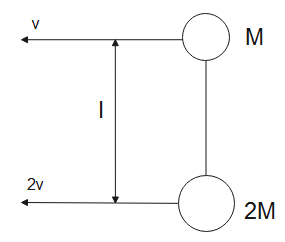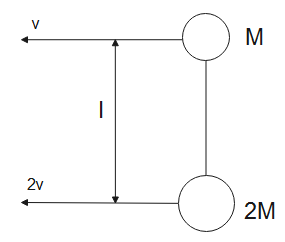Question
Question: On a smooth level ground we keep a light rod to which 2 masses M and 2M are attached. The velocity o...
On a smooth level ground we keep a light rod to which 2 masses M and 2M are attached. The velocity of these masses at the moment is shown here choose the INCORRECT statement.
(A). the velocities of masses remain constant
(B). the angular velocities of the rod is lv clockwise
(C). the rod is under tension
(D). the centre of mass will move in a straight line

Solution
When an object moves across a rough surface it decelerates due to the force of friction, which reduces the speed of the object until it has completed its course over the rough surface. When the object crosses onto the smooth surface it no longer decelerates.
Formulas used:
v=m1+m2m1v1+m2v2
Complete step by step solution:

Given, two masses M and 2M are attached to a light rod kept on a smooth surface. The velocities of the masses are v and 2v respectively. The formula for velocity of centre of mass is-
v=m1+m2m1v1+m2v2
Here, m1 and m2 are masses of the bodies
v1 and v2 are their velocities
In the above equation we substitute values to get,
v′=M+2MM×v+2M×2v⇒v′=3M3Mv∴v′=v
The velocity of centre of mass is v.
The angular velocity is ω=lv.
As the system is moving in a straight line, the centre of mass will also move in a straight line. The rod is under tension because of the normal forces acting between the rods and masses.
No external forces are acting on the system but there are internal forces like normal reaction between rods and masses due to which the velocities of the masses will change but the momentum of the system will be conserved.
Therefore, the velocities of the masses will not remain constant, so it is the incorrect statement. Hence, the correct option is (A).
Note: Normal reaction acts between two bodies in order to prevent them from passing through each other. It acts perpendicular to the surfaces. Since the system is isolated, the velocity of the centre of mass will remain constant. The position of centre of mass will lie more towards the heavier body.
